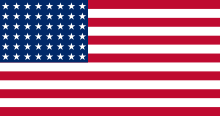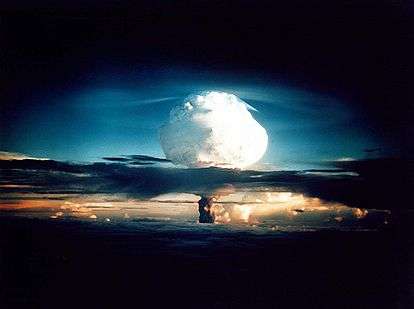1952 in the United States
| 1952 in the United States | |
|---|---|
| Years: | 1949 1950 1951 – 1952 – 1953 1954 1955 |
|
| |
 48 stars (1912–59) | |
|
Timeline of United States history
| |
Events from the year 1952 in the United States of America.
Incumbents
Federal Government
- President: Harry S. Truman (D-Missouri)
- Vice President: Alben W. Barkley (D-Kentucky)
- Chief Justice: Fred M. Vinson (Kentucky)
- Speaker of the House of Representatives: Sam Rayburn (D-Texas)
- Senate Majority Leader: Ernest McFarland (D-Arizona)
- Congress: 82nd
Events
January
- January 14 – The Today Show premieres on NBC, becoming one of the longest-running television series in America.
- January 20 - Stanley Eisen is born in New York City. He co-founds the rock band KISS and changes his name to Paul Stanley.
February
- February 2 – A tropical storm forms just north of Cuba moving northeast. The storm makes landfall in southern Florida the next day. It is the earliest reported landfall from a tropical storm, and the earliest formation of a tropical storm on record in the Atlantic basin.
- February 6 – In the United States, a mechanical heart is used for the first time in a human patient.
- February 20 – Emmett Ashford becomes the first African-American umpire in organized baseball, by being authorized to be a substitute umpire in the Southwestern International League.
March
- March 20 – The United States Senate ratifies a peace treaty with Japan.
- March 21 – Tornadoes ravage the lower Mississippi River Valley, leaving 208 dead, through March 22.
- March 22 – Wernher von Braun publishes the first in his series of articles entitled Man Will Conquer Space Soon!, including ideas for manned flights to Mars and the Moon.
- March 29 – U.S. President Harry S. Truman announces that he will not seek reelection.
April
- April 8 – Youngstown Sheet & Tube Co. v. Sawyer: The U.S. Supreme Court limits the power of the President to seize private business, after President Harry S. Truman nationalizes all steel mills in the United States, just before the 1952 steel strike begins.
- April 15 – The United States B-52 Stratofortress flies for the first time.
- April 23 – A nuclear test is held in the Nevada desert.
- April 28 – The Treaty of San Francisco goes into effect, formally ending the occupation of Japan.
- April 29 – Lever House officially opens in New York City, heralding a new age of commercial architecture in the United States.
May
- May 3 – U.S. lieutenant colonels Joseph O. Fletcher and William P. Benedict land a plane at the geographic North Pole.
June
- June 14 – The keel is laid for the U.S. nuclear submarine USS Nautilus.
- June 19 – The United States Army Special Forces is created.
July
- July 19–26 – Washington D.C. UFO incident. Several alleged UFOs tracked on multiple radars. Jets scramble on several occasions and the objects take evasive action, only to return after the jets leave the area.
- July 21 – The 7.3 Mw Kern County earthquake strikes Southern California with a maximum Mercalli intensity of XI (Extreme), killing 12 and injuring hundreds.
- July 25 – Puerto Rico becomes a self-governing commonwealth of the United States.
August
- August 29 – John Cage's 4' 33" premieres in Woodstock, New York.
September

November 1: Ivy Mike
- September 2 – Dr. C. Walton Lillehei and Dr. F. John Lewis perform the first open-heart surgery at the University of Minnesota.
- September 23 – Republican vice presidential candidate Richard Nixon gives his Checkers speech.
October
- October 12 – The Gamma Sigma Sigma National Service Sorority is founded in New York City at Panhellenic Tower.
- October 14 – The United Nations begins work in the new United Nations building in New York City.
- October 16 – Limelight opens in London; writer/actor/director/producer Charlie Chaplin arrives by ocean liner; in transit his re-entry permit to the USA is revoked by J. Edgar Hoover.
- October 1 to 31 – With an average coast-to-coast precipitation of 0.54 inches or 13.7 millimetres,[1] this is easily the driest month over the contiguous United States since reliable records began in 1895[2] (The second-driest, November 1917, averaged as much as 0.95 inches or 24.1 millimetres.)
November

November 4: Eisenhower elected in a landslide
- November 1 – Nuclear testing: Operation Ivy: The United States successfully detonates the first hydrogen bomb, codenamed "Mike", at Eniwetok Atoll in the Marshall Islands in the central Pacific Ocean, with a yield of 10.4 megatons.
- November 4
- United States presidential election, 1952: Republican President Dwight D. Eisenhower defeats Democratic Governor of Illinois Adlai Stevenson (correctly predicted by the UNIVAC computer).
- The U.S. National Security Agency is founded.
- November 20 – The first official passenger flight over the North Pole is made from Los Angeles to Copenhagen.
- November 29 – Korean War: U.S. President-elect Dwight D. Eisenhower fulfills a political campaign promise, by traveling to Korea to find out what can be done to end the conflict.
December
- December 1 – The New York Daily News carries a front page story announcing that Christine Jorgensen, a transsexual woman in Denmark, has become the recipient of the first successful sexual reassignment operation.
- December 14 – The first successful surgical separation of Siamese twins is conducted in Mount Sinai Hospital, Cleveland, Ohio.
- December 20 – The crash of a U.S. Air Force C-124 Globemaster at Moses Lake, Washington kills 86 servicemen.
Undated
- Nearly 58,000 cases of polio are reported in the U.S.; 3,145 die and 21,269 are left with mild to disabling paralysis.[3]
- The National Prohibition Foundation is incorporated in Indiana.
Ongoing
- Cold War (1945–1991)
- Second Red Scare (1947–1957)
- Korean War (1950–1953)
Births
- February 2 – John Cornyn, United States Senator from Texas since 2002.
- February 22 – Bill Frist, United States Senator from Tennessee from 1995 till 2007.
- March 8 – George Allen, United States Senator from Virginia from 2001 till 2007.
- April 16
- David Hann, politician
- Billy West, voice actor
- May 13 – John Kasich, Governor of Ohio
- May 21 – Mr. T, actor.
- May 25 – Gordon H. Smith, United States Senator from Oregon from 1997 till 2009.
- June 12 – Spencer Abraham, United States Senator from Michigan from 1995 till 2001.
- July 4 – Paul Rogat Loeb, author and activist
- July 8 – Jerry Hertaus, politician and businessman from Minnesota
- July 17 – David Hasselhoff, actor, singer, producer and businessman
- July 21 – John Barrasso, United States Senator from Wyoming since 2007.
- August 24 – Bob Corker, United States Senator from Tennessee since 2007.
- August 26 – Michael Jeter, actor (died 2003)
- September 25 – Christopher Reeve, actor and activist (d. 2004)
- October 22 – Jeff Goldblum, actor and former spouse of actress Geena Davis
- November 9 – Sherrod Brown, United States Senator from Ohio since 2007.
- November 12 – Ronald Burkle, entrepreneur
- December 2
- Rob Mounsey, keyboard player, composer, and producer (Joe Cool)
- Carol Shea-Porter, social worker, academic, and politician
- December 7 – Susan Collins, United States Senator from Maine since 1997.
Deaths
- February 7 – Pete Henry, American football player and coach (born 1897)
- August 16 – Lydia Field Emmet, painter (born 1866)
See also
References
- ↑ Contiguous U.S. Precipitation – October
- ↑ Winston, Jay S.; ‘The Weather and Circulation of October 1952: The Driest Month on Record in the United States’; Monthly Weather Review; 80(10); pp. 190-194
- ↑ Zamula, Evelyn (June 1991). "A New Challenge for Former Polio Patients". FDA Consumer. Food and Drug Administration. 25 (5). Archived from the original on January 26, 2008. Retrieved August 29, 2009.
External links
-
 Media related to 1952 in the United States at Wikimedia Commons
Media related to 1952 in the United States at Wikimedia Commons
This article is issued from Wikipedia - version of the 11/17/2016. The text is available under the Creative Commons Attribution/Share Alike but additional terms may apply for the media files.